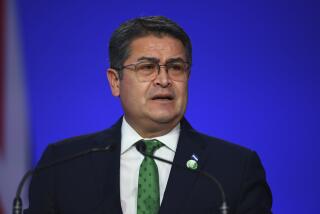Now the U.S. Must Face Its Past on Chile
- Share via
It has taken nearly 30 years, but former Chilean dictator Augusto Pinochet finally is being called to account before his nation’s courts. Late last week, a courageous Chilean magistrate formally charged the 85-year-old retired general for the kidnapping and murder of 77 civilians during the first few weeks of the military regime Pinochet established in 1973.
The historical ledger on Pinochet--who often fancied himself a liberator--was finally slammed shut when Magistrate Juan Guzman Tapia ordered the former dictator locked up under indefinite house arrest and bumped him up one step closer to trial. As the news crackled on radio and TV, countless Chileans sensed the gravity of the moment. Not only had the once supine Chilean justice system regained its independence, but the country as a whole was being given a much-needed opportunity to draw the balance sheet on its recent dark past. During the 17 years of the Pinochet dictatorship, more than 3,000 people were killed, a thousand of them “disappeared,” while tens of thousands had been tortured, imprisoned or hounded into exile.
Only a few years ago Pinochet’s current plight was unimaginable. All debate on human rights in Chile had been suffocated and Pinochet himself had become an unelected senator-for-life.
That all changed when Pinochet was held two years ago in London on an international warrant issued by a Spanish court. After 500 days in British custody, Pinochet was allowed to return home on questionable health reasons. But Chile had changed during his absence. The shock waves emanating from his London arrest had shook loose an ossified Chilean judiciary. And Pinochet soon became the target of an aggressive investigation, one that culminated in his formal indictment last Friday.
But now that Chile finally is coming to terms with its bloody history, will the U.S. follow suit and account for its role in supporting Pinochet when he rose to power?
One significant step in that direction occurred when the Clinton administration, under intense international pressure, began releasing thousands of previously secret U.S. government documents about our relationship to Pinochet. Those papers, the latest batch of which were released on Nov. 13, reveal not only new details about the copious amounts of financing the Nixon administration and the CIA handed out to the forces that brought Pinochet to power, but also prove that the U.S. government was, at the time, fully aware of the death squad barbarities for which the former general is now facing trial.
And we learn from other recently released documents that three years after Pinochet seized power, just as the bloodletting was reaching a frenzied crescendo, a crucial face-to-face meeting transpired in Santiago between U.S. foreign policy guru Henry Kissinger and the Chilean dictator. Transcripts of that meeting now archived at the Gerald Ford Presidential Library show Kissinger apologizing to Pinochet for any hiccups of protest coming from the U.S. Congress and reassuring the blood-stained general that he still retained full and unconditional American support.
A wily Pinochet clearly read the political message from Kissinger. Barely two months later, Pinochet’s most elite death squad had the audacity to forge ahead with a car bombing in downtown Washington D.C. that took the lives of dissident Orlando Letelier and his associate Ronni Moffit. That Pinochet himself played a direct role in these murders is now confirmed by intelligence reports among those released in November.
If a former Chilean head of state can be tried by his own courts for the heinous crimes he committed, why shouldn’t American officials be held morally and legally accountable for their complicity with him? Are the intellectual authors and financiers of mass murder any less guilty than the material executors? Clearly not.
Word comes from Washington D.C. that the Department of Justice may finally be ready to lodge its own indictment against Pinochet for his role in the Letelier murder. That would be another welcome step in clarifying the murky historical links between the U.S. and Pinochet. But we still will have not gone as far as the Chileans have.
It’s a safe bet that Kissinger will live out his final years in considerable more comfort and peace than his former interlocutor and political ally, the forlorn and abandoned Pinochet.
More to Read
Sign up for Essential California
The most important California stories and recommendations in your inbox every morning.
You may occasionally receive promotional content from the Los Angeles Times.













